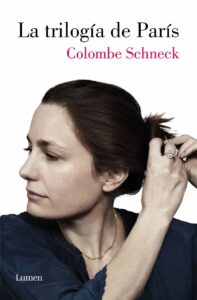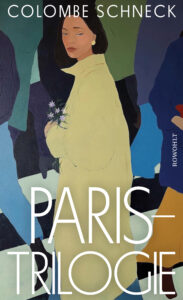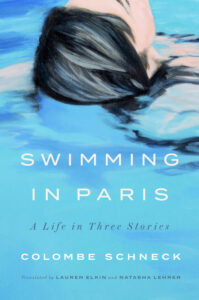The Paris Trilogy
Swimming in Paris
The Paris Trilogy is celebrated French author Colombe Schneck’s first English language publication, translated by Lauren Elkin and Natasha Lehrer.
Writing in response to Annie Ernaux and in conversation with Elena Ferrante, Colombe Schneck’s three semi-autobiographical takes on a woman’s life form an elegant, powerful exploration of sexuality, bodily autonomy, friendship, loss and renewal.
Colombe is seventeen in 1984 and carefree, busy discovering sex and studying for her baccalauréat. When she becomes pregnant her choice to have an abortion is never in question. Yet suddenly she must grapple with the body that has brought the precarity of her freedom into focus.
Colombe and Héloïse are two little Parisian liberals, friends since the age of eleven. They look alike, have similar upbringings and for years they follow parallel paths: university, love affairs, work, marriage, children, divorce, more love affairs. They are the most enduring witnesses to each other’s lives, until illness betrays them.
Colombe reconnects with Gabriel in her fifties; their relationship is passionate and transformative. As it unfolds, Colombe discovers many things about herself, including a newfound appreciation for swimming, and the euphoria and strength of a body learning when to push and when to let go.




Reviews
“This is valuable writing. It has immense vitality. You will encounter a female narrator whose direct and bright-eyed stare at the world, and her self, is without shame or faux modesty. At the same time, it is also a deep study of existence, at various ages and stages in life.”
— Deborah Levy
“Swimming is a dreamy, bruised, and carnal book that pretty much no American would write and pretty much every American will thrill to read. Schneck’s “discovery of her body, at the age of fifty” is our encounter with an entrancing mind.”
— Lauren Collins
“Schneck’s keen social observations, wry sense of humor, and subtle way with loss and emotional devastation… bears an eerie resemblence to Simone de Beauvoir.”— Lauren Elkin
“Schneck’s matter-of-fact delivery of all aspects of her lived experience lends a universal quality to the narrative; these observations made by one woman are broadly recognizable. Acknowledging the influence of Annie Ernaux on her thinking and her ability to write about issues intensely personal to women, Schneck carries that frank discussion forward with grace and hard-won knowledge. No pulled punches here, just truth.” — Kirkus, starred review
“Growing up in the 1970s and 80s amid Paris’s intellectual bourgeoisie, Colombe Schneck was ambitious and wilful. Then, aged 17, she became pregnant. While her choice to have an abortion was never in question, it felt as if her body had betrayed her, revealing the precariousness of her freedom. The episode haunts a vigorous midlife reckoning whose three slender volumes also consider a long friendship cut short by illness and a transformative fiftysomething love affair. Whether she’s writing about passion or perfecting the front crawl, there’s a frankness to Schneck’s meditations on womanhood – crisply translated here by Lauren Elkin and Natasha Lehrer – that is electrifying.” — The Guardian
“The ‘movements’ of The Paris Trilogy thrum with life, sparkle with insight. It was an exhilarating read. I’ve never encountered a more perfect depiction of how the world shrinks when you understand that you’re a ‘girl’, rather than a ‘person’. With this book, Colombe Schneck became my Claire Parnet.” — Natasha Brown, author of Assembly
“Beautiful… a gorgeous meditation on the vagaries of being alive.” — Publishers Weekly, starred review
“Schneck’s writing is sinewy, tough, sharp…. There is in Schneck’s books, as in Annie Ernaux’s, an utter refusal of sentimentality. Instead, there is an honest, intelligent, cool assessment of things… Even though Schneck works at a scale that is deliberately small, insistently concrete, and extremely lean, her writing somehow exposes whole vistas of the female experience.” — Katie Roiphe, The Atlantic

